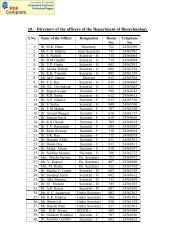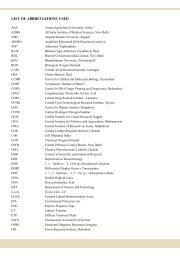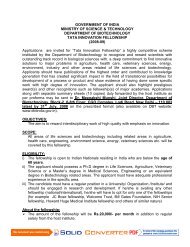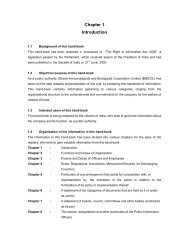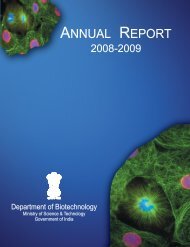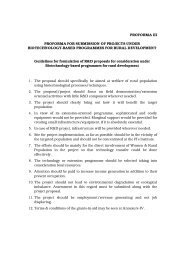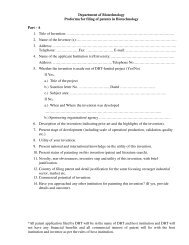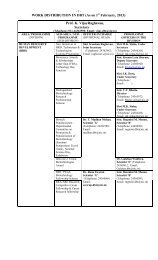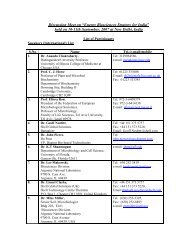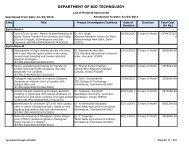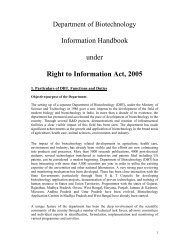ANNUAL REPORT - Department of Biotechnology
ANNUAL REPORT - Department of Biotechnology
ANNUAL REPORT - Department of Biotechnology
Create successful ePaper yourself
Turn your PDF publications into a flip-book with our unique Google optimized e-Paper software.
Programmes for SC and ST Population<br />
<strong>Biotechnology</strong>-based Programme for SC/ST<br />
population has benefited around 65,000 people<br />
through 50 ongoing projects and 12 new ones during<br />
the year. The projects supported cover cultivation <strong>of</strong><br />
medicinal and aromatic plants, production <strong>of</strong><br />
bi<strong>of</strong>ertilizers and biopesticides, organic farming,<br />
aquaculture, mushroom cultivation as well as human<br />
healthcare interventions etc. Universities, Krishi<br />
Vigyan Kendras and voluntary/non-governmental<br />
organizations have been involved in the<br />
implementation <strong>of</strong> the projects. The target group<br />
received the benefit <strong>of</strong> hands-on training and field<br />
demonstrations to bring greater awareness. Salient<br />
achievements <strong>of</strong> the programme are as follows:<br />
Integrated Aquaculture<br />
Activities on integrated aquaculture were undertaken<br />
through awareness programme conducted for the<br />
farmers in West Bengal. Farmers were trained in<br />
maintaining the ducks, poultry birds, pigs in<br />
integration with fish culture in addition to their<br />
domestic farm based activities. Around 3500 families<br />
were benefited through integrated fish farming.<br />
Integrated scampi-fish culture was undertaken in<br />
Allahabad district through small scale production <strong>of</strong><br />
prawn seeds at the hatchery. Villagers were trained<br />
on technicalities <strong>of</strong> seed production and freshwater<br />
prawn culture. Honey production was also taken up<br />
to help target population in additional income<br />
generation. Farmers were trained on technologies<br />
through monoculture and polyculture at<br />
Palayamkottai in Tamil Nadu. Different species <strong>of</strong><br />
murrels, Channa striatus, C. punctatus and C.<br />
micropeltus, were collected and successfully breed.<br />
Breeding and feeding technologies developed were<br />
standardized and disseminated to the beneficiaries.<br />
Cage culture activity was taken up for rearing <strong>of</strong><br />
fingerlings in the reservoir with faster growth, high<br />
survival and reduces transportation losses and cost<br />
133<br />
Chapter- 6<br />
<strong>Biotechnology</strong> for Societal Development<br />
<strong>of</strong> large size fish seed. Technology on floating cages<br />
was demonstrated through installation in Halali<br />
Reservoir in Bhopal with effective utilization <strong>of</strong> feed to<br />
benefit cooperative societies/self help groups,<br />
graduate and postgraduate entrepreneurs.<br />
Techniques <strong>of</strong> crab and lobster fattening were<br />
disseminated in coastal villages <strong>of</strong> Tamil Nadu as<br />
viable alternative livelihood. The activity was<br />
extended for post tsunami rehabilitation<br />
programmes. About 1000 farmers have been<br />
benefited through the implementation <strong>of</strong> the projects.<br />
Fattening techniques transferred to fisher folk helped<br />
to sustain income generation by coastal villages.<br />
DRDA has taken up the extension <strong>of</strong> the activity<br />
through establishment <strong>of</strong> crab fattening unit for<br />
dissemination <strong>of</strong> technological know-how. Model<br />
crab fattening units were replicated in Pudukottai<br />
District and 60 women were trained. Around 261 fish<br />
farmers benefited through implementation <strong>of</strong> the<br />
programme.<br />
Techno-economically feasible treatment <strong>of</strong> parboil<br />
rice mill waste followed by recycling through<br />
aquaculture was taken up in Gondia District in<br />
Maharashtra with a view to generate additional<br />
Harvesting <strong>of</strong> fish and prawn <strong>of</strong><br />
a polyculture pond in Mysore<br />
<strong>Biotechnology</strong> for Societal Development



